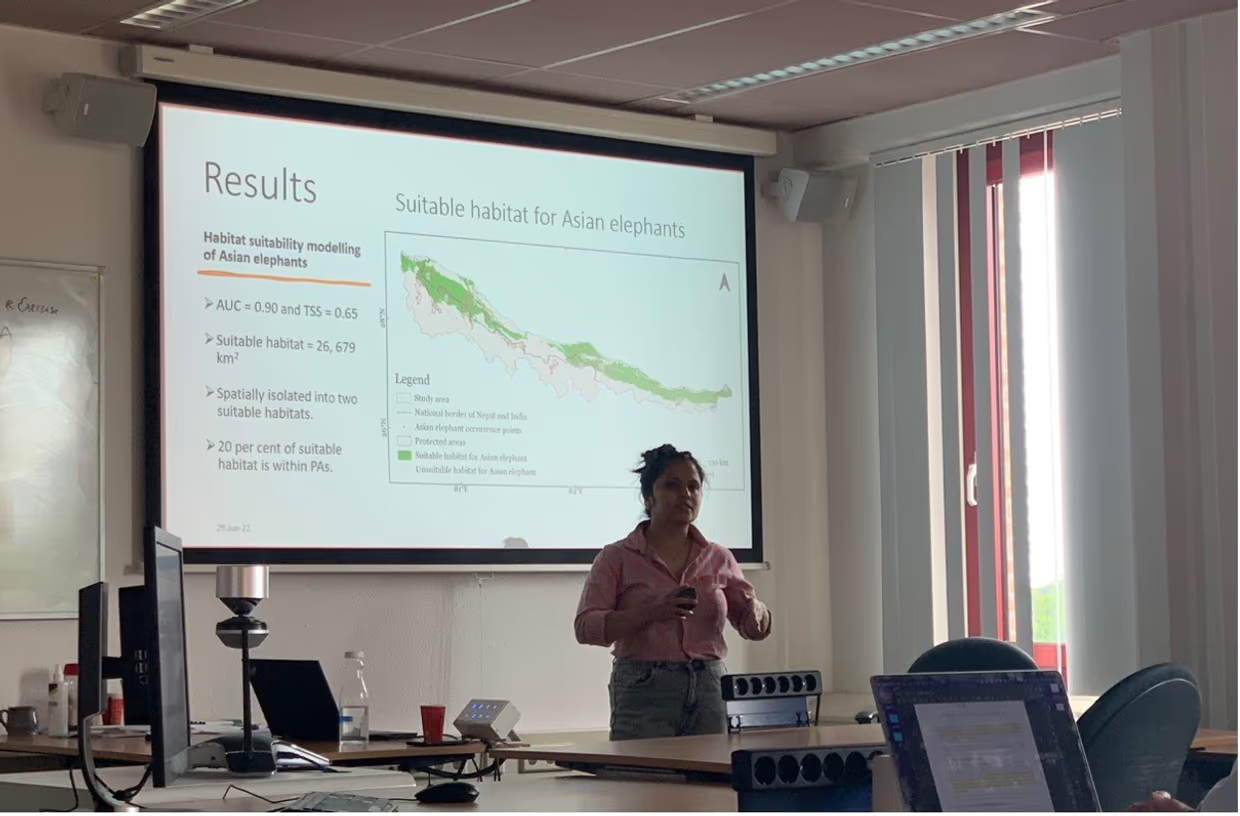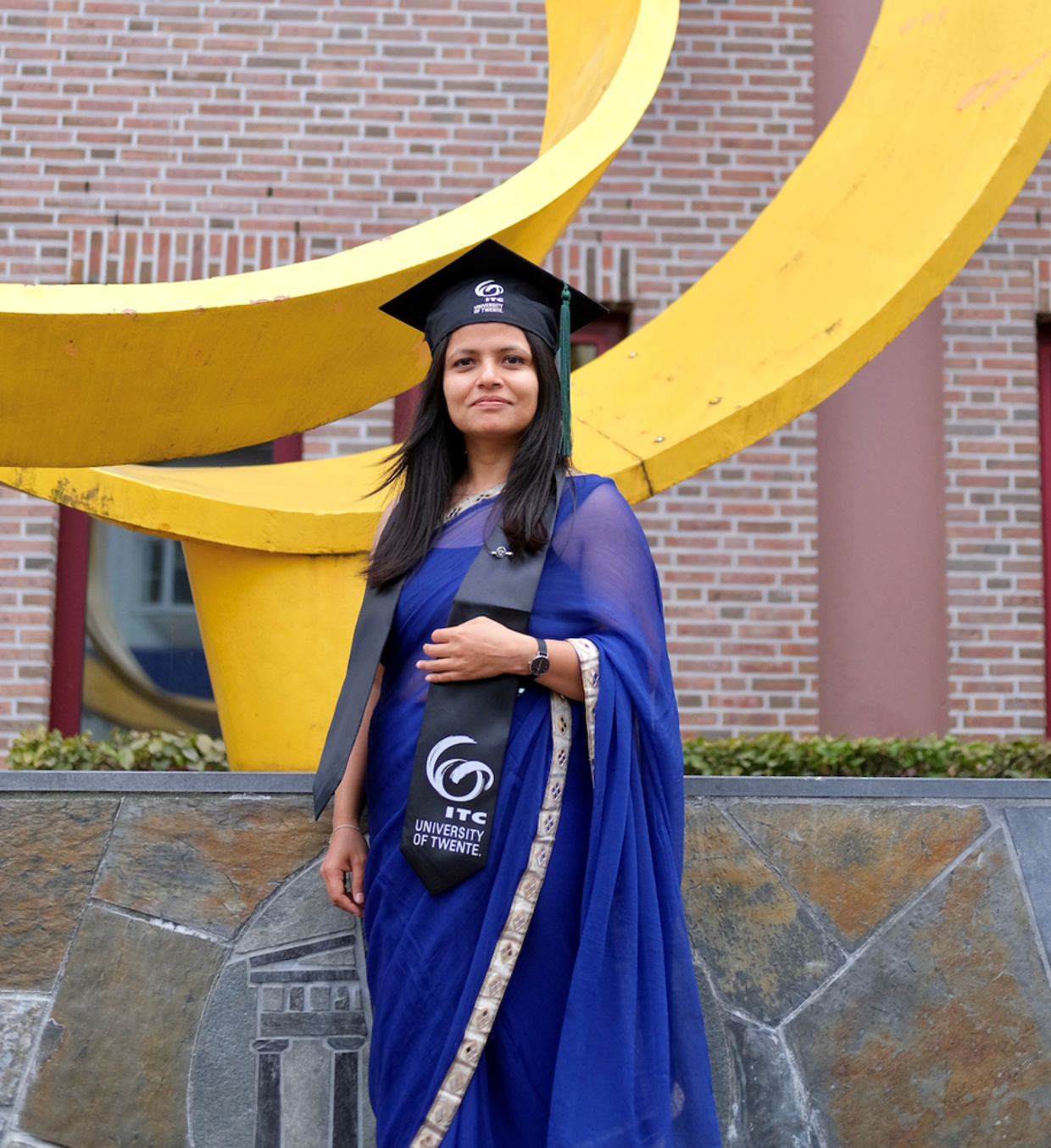Destruction of their natural habitat, poaching for ivory and other conflicts with humans are the main reasons that made Asian elephants part of the IUCN endangered species list. Asian elephants roam the border regions of Nepal and India, but these human interventions are causing conflicts that put at risk the conservation of these species. Binita Khanal, from Nepal, came to study Natural Resources at the ITC and focused her thesis on predicting human-elephant conflicts using machine learning technology.
1. What was your experience studying the Master's program at NRS?
The opportunity to study geo-information science and earth observation at ITC, specialising in natural resource management, has been an incredible experience. I started my MSc at the peak of the pandemic. I have endured many ups and downs in these two years of journey. Initially, I struggled to adjust to a new set of environments and teaching approaches as everything was online. I spend most of my first year inside my room, taking lectures and studying. But the professors were helpful. They did their best to make the student feel comfortable and facilitate learning. It will be fair to say that the NRS department is one of the best departments at ITC. I thoroughly enjoyed my study at NRS.
2. How was your experience in the Netherlands and the ITC building?
My stay in the Netherlands was filled with mixed emotions. As I come from Nepal, I mostly used to miss the sights of mountains and Nepalese food. But slowly, I got habituated to this place, and now Enschede feels like home. I saw the ocean for the first time in the Netherlands. I love how big the sky looks in the Netherlands. Sunsets are just fantastic during summer. I admire Dutch food like poffertjes, sausages and, of course, cheese.
I have so many good memories at ITC. The most profound memories would be all the classmates coming together to celebrate each other's birthdays. I also loved coffee breaks where I shared ideas, motivational words, laughter and conversations. I compensated for my first year living in lockdown in the second year by attending parties, food festivals, sports week and other socialising activities. I feel proud to be associated with a world-renowned educational institute like ITC. ITC is diverse yet connected. ITC has provided a platform, resources, connection with research communities and most importantly, with friends from around the world who will remain associated with my life.
3. What was your favourite course and why?
I have learned something from the master's courses in geo-information science and earth observations. However, I have two courses, Species distribution and environmental niche modelling and Advanced image analysis, which I enjoyed most while studying. In these courses, I learned about statistical and machine learning modelling approaches, geospatial data analysis and interpretation of the result, focusing on natural resource management and biodiversity conservation. Since my thesis focused on the interplay of remote sensing, machine learning and biodiversity conservation, I found these courses particularly important to understand the concepts of modelling, data analysis techniques and R-programming.
4. What topic did you choose for your thesis and why?
My thesis topic is "Using machine learning to predict the risk of human-elephant conflict in Nepal-India transboundary region".
I have been passionate about biodiversity conservation since my early days during my bachelor's study. When I was working in Nepal at the field level interacting with communities promoting wildlife conservation, I found that human-wildlife conflict threatens the well-being of humans and the wildlife itself. The impacts of human-wildlife conflict are particularly sensitive in the case of endangered species like elephants.
The cross-border regions between Nepal and India are the natural habitats for Asian elephants. However, this region has experienced dramatic land cover and land use changes due to human pressure and infrastructure development over the last several decades. Habitat loss and fragmentation drive elephants closer to human settlements and cause more frequent human-elephant conflicts. I was interested in understanding the dynamics of suitable habitat distribution of elephants in these transboundary landscapes and the spatial distribution of human-elephant conflict within the suitable habitat of elephants to mitigate human-elephant conflict. Fortunately, I found a supervisor who motivated me to develop my interest into a thesis.
5. What did you learn during your thesis?
While engaging in the research you are passionate about is fun, it can sometimes be stressful and challenging. During the thesis, I learned about state-of-the-art technology like remote sensing and machine learning and how they can be combined to analyse environmental issues to facilitate informed decision-making. Apart from technical aspects, conducting independent research has helped me develop my personal skills and time management. I learned that following the schedule is crucial to maintaining steady work progress. Taking a break sometimes can help for fresh thinking and exploring a new perspective. It is crucial to have a plan B just in case the original plan couldn't be completed due to many limitations.
6. How do you plan to continue developing your career? Is your plan aligned with the same topic as your thesis?
I am interested in developing my career in academic research. I am looking forward to a PhD in remote sensing and biodiversity conservation, which also aligns with the thesis topic of my master's degree.
7. Is there anything else you would like to add to this interview? Any special words for a teacher or classmates?
The successful completion of the master's degree wouldn't have been possible without constant support from my two supervisors, Dr Tiejun Wang and Raymond Nijmeijer.
I feel lucky that I found such wonderful friends and classmates to make life easier in the Netherlands. Special mention goes to my friends from studio 5-036, who helped me with my study and life in general. Thank you!




